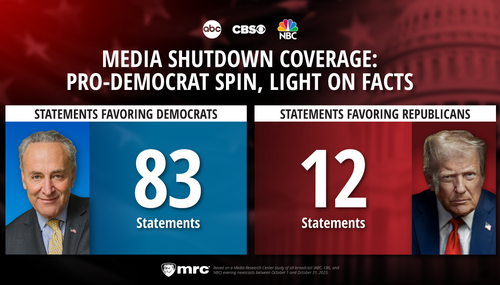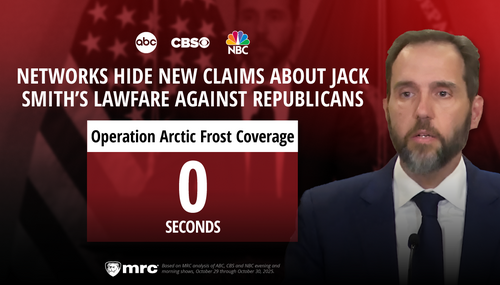Brent Bozell's latest culture column reported on how Entertainment Weekly offered a very one-sided cover story cheering for gay teen characters on TV to "enlighten" the culture about the need for "tolerance" (defined as the notion that no one should ever tolerate the idea that homosexuality is a sin, like centuries-old religions with billions of adherents do.)
In a blog post, the cover story's writer, Jennifer Armstrong, kept pushing the notion that gay "visibility" advocates need to cross the "final complicated frontier" of TV shows watched by grade-schoolers on the Disney Channel and Nickelodeon:
On sitcoms like Hannah Montana and iCarly, characters develop occasional crushes, but a mere peck is cause for audience oohing and aahing. But, as AfterElton.com’s Michael Jensen pointed out in a recent post, “Obviously, Disney deals with the sexuality of its teen characters all the time as they have crushes, flirt, and go on dates.” Why not have a same-sex crush, flirtation, or date?
Sources at the networks said it still felt a little “inappropriate” for their light-hearted programming given the complications and drama involved in the life of a teen who’s just coming out, while Disney issued the following statement: “We recognize our responsibility to present age-appropriate programming for millions of kids age 6-14 around the world, and we aim to tell great stories with an array of relatable characters and themes that address the needs and aspirations of our young viewers, augment Disney Channel’s themes of communication and optimism, and fulfill our brand promise to encourage kids to ‘express yourself,’ ‘believe in yourself,’ and ‘celebrate your family.’”
Fair enough. But what of the more flamboyant characters whom viewers have sometimes interpreted as possibly gay, as one fan pointed out to AfterElton.com about Shake It Up!‘s Gunther? “We leave it up to our audience to interpret who these characters are and how they relate to them,” Disney Channel President Gary Marsh told the site. “It’s great that this child has interpreted Gunther this way and that it speaks to him in a way that makes sense for his life. And that’s what we’re trying to do — create a diverse cross section of characters on television that kids can have different access points and entry points to connect with.”
These networks — to which parents pay particularly close attention — may be the final, complicated frontier for gay teen representation on TV.
But in the AfterElton interview, the aforementioned Michael Jensen just kept angrily pressuring the Disney Channel boss Gary Marsh to surrender to the demands of the gay left, that unless you push sexual-orientation issues on six year olds, you're "treating gay people as second class." This isn't really so much an interview as an exercise in intimidation:
JENSEN: You and I first spoke three years ago about whether the Disney Channel might ever include a gay character on one of your shows. I'm wondering if things might have changed since then. You currently have a show called Shake It Up! and a fourteen-year-old fan of the show brought it to our attention saying that he interpreted the character of Gunther as gay, even though he didn't think the show would ever say the character was gay. So I'm wondering, given Disney's history of being racially diverse and so influential in the lives of young kids, is Disney ever going to be including gay characters in age appropriate ways?
MARSH: What I said before really remains true. We leave it up to our audience to interpret who these characters are and how they relate to them. It's great that this child has interpreted Gunther this way and that it speaks to him in a way that makes sense for his life. And that's what we're trying to do -- create a diverse cross section of characters on television that kids can have different access points and entry points to connect with.
JENSEN: But why is a gay character something a gay teen should have to interpret? Why can't there be an age appropriate way to specifically include a gay character? On Shake It Up! two of the straight characters go out on a date. Why does the gay kid have to settle for interpreting [Gunther is gay]? You wouldn't say that to a black kid.
Gunther on the new show Shake It Up is supercilious, vaguely European, a dancer, and wears some sparkles. That means Mr. After Elton wants him to offer a little eleven-minute leftist lecture from the GLAAD Training Handbook to the six-year-olds in the audience. It continued:
MARSH: In fact, there's all sorts of range. That's a great example. We are colorblind. We don't articulate different parts for different ethnicities. In fact that happens all the time.
JENSEN: Yes, but it is clear when a character is black.
MARSH: Sometimes it is and sometimes it isn't.
JENSEN: Okay then, multiethnic. Clearly when you watch the show, the shows are multiethnic. But it's not clear that the show includes gay characters because kids are having to "interpret" them that way. I don't understand why the gay kids are being told they are second class citizens and have to settle with "interpreting" that some characters are gay like them.
MARSH: I don't know that that has a thing to do with being second class.
JENSEN: Are you saying at some point we might see a gay kid going on a date?
MARSH: I'm saying I don't know where the series or the Disney Channel or the world might evolve to in that regard. But I don't see it has some sort of second class...
JENSEN: So the fact that Disney has never included an out gay character isn't somehow treating gay people as second class?
MARSH: As you said, according to you, this child is interpreting this person has a gay character. And that seems to work fine for him.
JENSEN: No, he's settling for it.
MARSH: I don't know what that means.
JENSEN: It means he has to say, "Well, this is the best I can hope for. This character seems gay and I can interpret him that way, and that's what I have to settle for."
MARSH: I think that seems to be working for him.
JENSEN: [he inserts into the transcript "long pause"]: Okay, I guess we'll just have to disagree. I just don't understand how you can say to a young gay viewer "Your orientation is something we're so ... leery of that we're not going to make it clear." That really seems fair and healthy? You know, we've got all these gay kids out there and this year we've some of them are clearly struggling and being bullied and that led to the "It Gets Better" campaign to say to gay kids, "We know you get get treated unfairly in school, we know you get picked on in school, we know people don't understand. And yet here is the biggest entertainment company in the world [for kids] basically saying "Well, we're not going to do anything to make you feel better about your place in the world and help educate people." And I'm just really surprised.
Gay activists are always shocked that they haven't won over the entire religious world in two seconds. They demand surrender, and are shocked when someone sticks to their holy book or holy God -- or in this case, when a corporate executive just won't make any promises to start invading the "final frontier" in the gay culture revolution.




